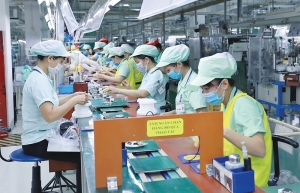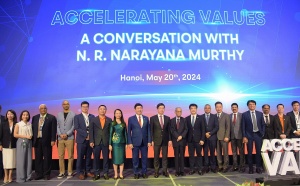Inflows picking up the pace for semiconductors
During the official visit to South Korea last week, under the witness of Prime Minister Pham Minh Chinh, Vice Chairman of Bac Ninh People’s Committee Vuong Quoc Tuan handed an investment certificate to Amkor Technology Singapore Holdings on factory adjustments for manufacturing, assembling, and testing semiconductor materials and equipment.
| Inflows picking up the pace for semiconductors, illustration photo/ Source: freepik.com |
Soon after putting the first phase project into operation, the semiconductor industry giant decided to raise its investment by $1.07 billion, the first billion-dollar foreign-invested project in 2024.
This was the highlight of foreign direct investment (FDI) as reported in the first half of the year as revealed by the Foreign Investment Agency under the Ministry of Planning and Investment (MPI).
Amkor’s additional registered investment in June has captured 47.3 per cent of the total additional investment in six months ($3.95 billion), an increase of 35 per cent on year, instead of continuously decreasing in previous months.
In the previous plan, Amkor intended to spend $1.6 billion by 2035, but after the inauguration last October, the company decided to carry out it as soon as possible. Amkor received the investment registration certificate in 2021 in South Korea with an investment of about $530 million, which is expected to be disbursed in five years.
Amkor is headquartered in the United States and founded by South Koreans, but invests in Vietnam through various legal entities in Singapore.
Semiconductors are heating up FDI inflows into Vietnam. “Despite being on a downtrend, global investment flows are still interested in Asia and into emerging industries, which will impact the FDI inflows into Vietnam. In the time coming, FDI into high-tech fields and semiconductor chips will get more dynamic,” said Luong Van Khoi, vice chairman of the Central Institute for Economic Management under the MPI.
The wave of investing in semiconductor chips has been speeding up since last year, when numerous US investors arrived in Vietnam and expressed their interest in semiconductors.
At the meeting with Minister of Planning and Investment Nguyen Chi Dung in the US at the end of June, Richard Lawton Thurston, former vice president of Taiwan’s TSMC, the largest semiconductor manufacturer in the world, said that Vietnam has a huge opportunity to develop the semiconductor and AI industry.
“AI development needs many different technologies, including sensors, memory, data collection, and processing. Therefore, Vietnam should choose one of the stages to focus on developing and building a strategy,” Thurston said.
Thurston has assisted many companies and governments in establishing and managing technology parks around the world. The MPI minister asked Thurston to share his experiences in developing the semiconductor industry in Vietnam, and provide recommendations for developing it, especially in terms of human resource development and investment promotion.
Minister Dung also asked Thurston to support connections, welcome TSMC to invest in Vietnam, and invite him to be an advisor to Vietnam in the semiconductor industry. Thurston declared he will cooperate and attempt to support the implementation of the minister’s proposals. He accepted the invitation to act as an advisor to Vietnam in developing plans and roadmaps for the semiconductor industry development.
The semiconductor industry produces electronic components based on semiconductors such as silicon, quartz, gallium arsenide, and other materials. The development of IT, telecommunications, AI, and self-driving cars has increased demand for semiconductor components.
 | South Korea to invest $7 billion in AI by 2027 South Korea will invest almost $7 billion in artificial intelligence by 2027 in an effort to become a global leader in cutting-edge semiconductors, President Yoon Suk Yeol said Tuesday. |
| A strengthened high-tech workforce for semiconductors Vietnam has plenty of work to do if it wants to become a true global hub for semiconductor manufacturing. Dr. Quan Le, principal investigator for the Semiconductor Workforce Development Research Grant under Fulbright University Vietnam, covered the potential for Vietnam and how to reach it with VIR’s Vy Vy. |
 | Technology giants keen to embrace gifted engineers Many excellent Vietnamese students could soon have opportunities to improve their knowledge and work in microchips and semiconductors at research and development centres of tech groups such as Samsung and Hana Micron. |
 | Vietnam welcomes Indian interest in hi-tech and semiconductor sectors The Vietnamese government opens its arms to Indian entrepreneurs and businesses to invest in high-technology, semiconductors, and digital technology, according to Deputy Minister of Information and Communications Bui Hoang Phuong. |
What the stars mean:
★ Poor ★ ★ Promising ★★★ Good ★★★★ Very good ★★★★★ Exceptional
Related Contents
Latest News
More News
- Kurz Vietnam expands Gia Lai factory (February 27, 2026 | 16:37)
- SK Innovation-led consortium wins $2.3 billion LNG project in Nghe An (February 25, 2026 | 07:56)
- THACO opens $70 million manufacturing complex in Danang (February 25, 2026 | 07:54)
- Phu Quoc International Airport expansion approved to meet rising demand (February 24, 2026 | 10:00)
- Bac Giang International Logistics Centre faces land clearance barrier (February 24, 2026 | 08:00)
- Bright prospects abound in European investment (February 19, 2026 | 20:27)
- Internal strengths attest to commitment to progress (February 19, 2026 | 20:13)
- Vietnam, New Zealand seek level-up in ties (February 19, 2026 | 18:06)
- Untapped potential in relations with Indonesia (February 19, 2026 | 17:56)
- German strengths match Vietnamese aspirations (February 19, 2026 | 17:40)

 Tag:
Tag:


















 Mobile Version
Mobile Version